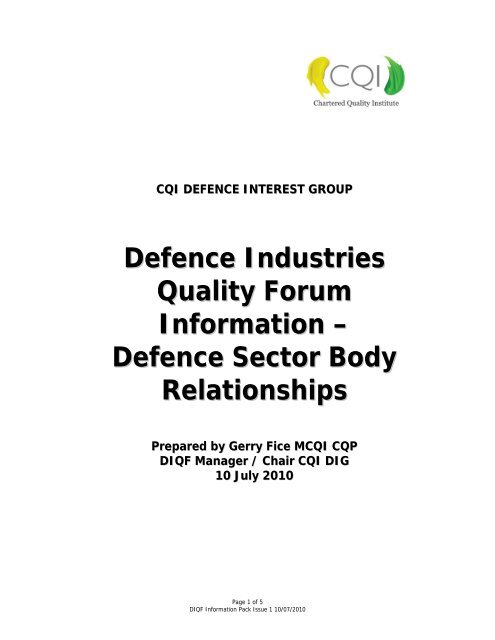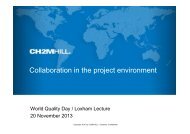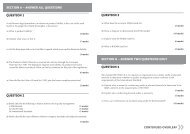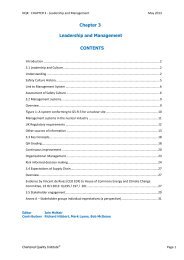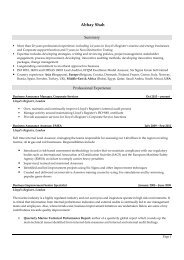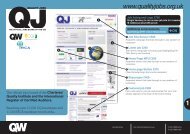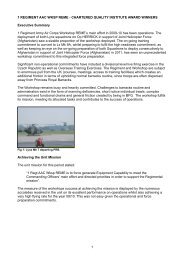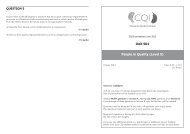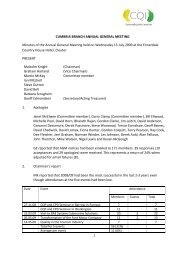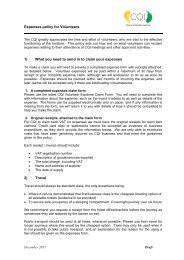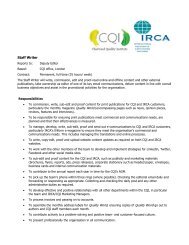Defence Industry Body Relationships - Chartered Quality Institute
Defence Industry Body Relationships - Chartered Quality Institute
Defence Industry Body Relationships - Chartered Quality Institute
Create successful ePaper yourself
Turn your PDF publications into a flip-book with our unique Google optimized e-Paper software.
CQI DEFENCE INTEREST GROUP<strong>Defence</strong> Industries<strong>Quality</strong> ForumInformation –<strong>Defence</strong> Sector <strong>Body</strong><strong>Relationships</strong>Prepared by Gerry Fice MCQI CQPDIQF Manager / Chair CQI DIG10 July 2010Page 1 of 5DIQF Information Pack Issue 1 10/07/2010
ForewordThis Information Report has been prepared in response to the inaugural CQI <strong>Defence</strong> InterestGroup (DIG) Steering Group Meeting action on members to raise awareness of the <strong>Defence</strong>Industries <strong>Quality</strong> Forum (DIQF) and to influence their Senior Management to highlight thework and importance of the DIQF to the defence Industries Council (DIC) and the National<strong>Defence</strong> Industries Council (NDIC).The following diagram indicates the various relationships at all levels between <strong>Defence</strong> Sectorbodies. The narrative following the diagram details the roles and responsibilities of thementioned bodies.ChairSecretary of Statefor <strong>Defence</strong>MembersNational <strong>Defence</strong>Industries Council2 nd PermanentUnder Secretary<strong>Defence</strong> IndustriesCouncilMembers<strong>Industry</strong>TradeAssociationsAccreditationBodies3 rd PartyCertificationBodiesIndividualSuppliersMembersIndividualmembers<strong>Defence</strong> Industries<strong>Quality</strong> ForumCQI<strong>Defence</strong>InterestGroupMembersMOD SectorSchemeIndividualmembersIndividualmembersChief <strong>Defence</strong>Materiel (DE&S)<strong>Defence</strong> <strong>Quality</strong>Assurance Authority<strong>Defence</strong> <strong>Quality</strong>Assurance - PolicyRegistered by DQA-Pol<strong>Defence</strong> <strong>Quality</strong>Assurance FieldForce(Also member of DIQF)DirectorPersonnelDelegatedHead ofProfession forMODMemberCommitteesISOBSNATO<strong>Defence</strong> Sector <strong>Quality</strong> <strong>Relationships</strong>Secretary of State for <strong>Defence</strong>The Secretary of State for <strong>Defence</strong> is the Cabinet Minister charged with making and executing<strong>Defence</strong> policy and providing the means by which it is executed through the Armed Forces.Although responsible ultimately for all elements of <strong>Defence</strong>, the Secretary of State issupported by a number of subordinate Ministers, who are assigned responsibilities for specificaspects of <strong>Defence</strong> business, one of whom is the 2 nd Permanent Under Secretary (2nd PUS).Page 2 of 5DIQF Information Pack Issue 1 10/07/2010
2nd Permanent Secretary (2nd PUS)Together with the Vice Chief of the <strong>Defence</strong> Staff (VCDS), 2nd PUS acts as joint ChiefOperating Officer for <strong>Defence</strong>, ensuring that strategic decisions are implemented andmanaging performance across the board. She co-chairs the <strong>Defence</strong> Operating Board withVCDS, using it to identify and solve problems; to give clear direction; and to drive forwardmajor and cross-cutting change programmes. She ensures effective civilian support tocurrent operations through oversight of the Support to Operations programme. She hasresponsibility for <strong>Defence</strong> Acquisition Reform, including the Acquisition Operating Framework(AOF) and Portfolio Management of major change programmes. She delegates therequirement to set up <strong>Defence</strong> <strong>Quality</strong> Assurance Authority to Chief of <strong>Defence</strong> Materiel(CDM).Chief of <strong>Defence</strong> Materiel (CDM)CDM is the head of <strong>Defence</strong> Equipment & Support (DE&S). He has responsibility for:• Providing equipment and logistic support to current operations, including deliveryagainst Urgent Operational Requirements;• Delivering funded equipment acquisition and support outputs, as agreed with FrontLine Commands and the Head Office;• Delivering projects to performance, time and cost targets, in accordance with agreedasset delivery plans;• Managing safety, risk and environmental issues in accordance with mandatedrequirements and appropriate best practice;• Continuing to transform DE&S, through delivery of the PACE (Performance; Agility;Confidence; Efficiency) change programme;• Supporting <strong>Defence</strong> acquisition reform efforts, including through the delivery ofappropriate elements of the <strong>Defence</strong> Acquisition Reform Programme;• Setting up the <strong>Defence</strong> <strong>Quality</strong> Assurance Authority;• Managing key relationships with industrial suppliers, <strong>Defence</strong> stakeholders andinternational partners, at the highest levels;• Representing UK interests in international military and political fora, including NATOand the EU:<strong>Defence</strong> <strong>Quality</strong> Assurance Authority (DQAA)The DQAA is the Director General Safety & Engineering who operates under a letter ofdelegation from CDM. He is the professional head of the QA function within the MOD and isthe MOD authority on matters of policy and professional standards pertaining to quality andits assurance for all MOD acquisition across the contractual boundary. He has responsibilityfor consulting with stakeholders, both internally and externally to the MOD in order todevelop and improve policy, processes and standards. He delegates these responsibilities tohis <strong>Defence</strong> <strong>Quality</strong> Policy team<strong>Defence</strong> <strong>Quality</strong> Assurance Policy (DQA-Pol)The Assistant Director of DQA-Pol leads a small team of quality professionals who act as theexecutive arm of the DQAA. They have responsibility to develop, implement and improve<strong>Quality</strong> policy, processes and standards for the acquisition community, internally andexternally to the MOD. To enable this they are members of many committees and fora, e.g.BS, ISO NATO and have set up the <strong>Defence</strong> Industries <strong>Quality</strong> Forum within the <strong>Defence</strong>Sector. Communication of these policies is undertaken mainly through the Managing <strong>Quality</strong>web pages on the Acquisition Operating Framework. The Assistant Director of DQA-Pol is alsothe Head of Profession for <strong>Quality</strong> and Configuration Management within the MOD. This rolePage 3 of 5DIQF Information Pack Issue 1 10/07/2010
includes the requirement to identify the skills required for MOD <strong>Quality</strong> practitioners andsponsoring the necessary related learning and development activities. A MOD Sector schemehas been set up with the CQI enabling MOD Licensed <strong>Quality</strong> Practitioners to obtainautomatic membership of the CQI.<strong>Defence</strong> Industries <strong>Quality</strong> ForumThe <strong>Defence</strong> Industries <strong>Quality</strong> Forum (DIQF) was set up, circa 1990, to facilitate consultationbetween the Ministry of <strong>Defence</strong> (MoD) and major <strong>Defence</strong> <strong>Industry</strong> Trade Associations withthe aim; of encouraging feedback, dissemination and identifying good QA practice; to addressall issues pertaining to the quality, and assurance, of products and services delivered to thecustomer. It also assists the <strong>Defence</strong> <strong>Quality</strong> Assurance Authority, through DQA-Pol, inmeeting his delegated responsibility to consult widely with <strong>Industry</strong> in setting and improvingpolicy. The product of the DIQF is a set of coherent QA policies, principles and practices thatsupport the assurance activities undertaken by both MoD Project Teams and Suppliers toprovide confidence in the delivery of a product that fully satisfies the requirements of theMilitary Sponsor. The DIQF comprises representatives from major defence TradeAssociations, the Third Party Certification Bodies, The United Kingdom Accreditation Service(UKAS), the CQI and the MoD all of whom are involved in either the development orimplementation of QA policy. It is jointly chaired by the MOD and <strong>Industry</strong>. It reports throughthe National <strong>Defence</strong> <strong>Industry</strong> Council (NDIC) structure and is managed by a Business Plancontaining six top level objectives as well as identifying and planning to mitigate identifiedrisks.Their present objectives are:• Produce DIQF Strategy• Improve <strong>Quality</strong> Professional Competence and <strong>Quality</strong> ownership by others• Establish measures of effective <strong>Quality</strong> performance• Drive alignment of <strong>Quality</strong> policies and standards• Establish effective Planning for <strong>Quality</strong>• Improve tools for achieving confidence in Suppliers, throughout the Supply ChainThese are being progressed through Working Groups of subject matter experts throughoutthe <strong>Defence</strong> Sector led by a DIQF member. As discussed at the Steering Group Meeting, theDIQF could exist within its own right by DQA-Pol meeting its delegated responsibility to set upthe DIQF. However to meet its responsibility through the NDIC structure it does require somedirection, which is not being clearly given at the present.National <strong>Defence</strong> Industries Council (NDIC)The National <strong>Defence</strong> Industries Council (NDIC) brings together ministers and senior officialsfrom the Ministry of <strong>Defence</strong>, the Department of Business Innovation and Skills and HMTreasury to consult with the defence industry and trade union representatives. It meets fourtimes a year and is chaired by the SofS for <strong>Defence</strong> or the Minister of State for <strong>Defence</strong>Equipment and Support. The NDIC gives industry the opportunity to raise important issueswith Ministers and also to develop policy and practice through a range of joint activitiesbetween the MoD and industry carried out under the umbrella of the NDIC. Secretariatsupport for the NDIC is provided by MOD. The structure of the NDIC and its committees areunder review at present and the decision on where the DIQF sits within that structure has notyet been finalised.Page 4 of 5DIQF Information Pack Issue 1 10/07/2010
<strong>Defence</strong> Industries Council (DIC)The <strong>Defence</strong> Industries Council (DIC) consists of a number of defence individuals andrepresentatives of defence trade associations who provide advice to government on defenceindustrial issues. It aims to take a strategic perspective of the interests of the UK defenceindustry and represent them effectively to Government notably through the National <strong>Defence</strong>Industries Council (NDIC) and in other relevant national and international fora. It meets fourtimes per year just prior to the NDIC meeting.Present DIC MembershipIan KingSir John RoseAndrew WhiteAlex DorrianLeo QuinnDavid PriceRichard MartinSir Kevin TebbitPeter RogersSandy WilsonVictor ChavezPaul LesterAlan JohnstonJohn HigginsChristopher McHughIan GoddenRees WardChief Executive Officer, BAE Systems andChairman of the <strong>Defence</strong> Industries CouncilChief Executive Officer, Rolls RoyceChief Executive Officer, Serco <strong>Defence</strong>, Science & NuclearChief Executive Officer, Thales UK and President, A|D|SChief Executive Officer, QinetiQChief Executive Officer, Chemring GroupChairman, Kembrey Wiring SystemsChairman, Finmeccanica UKChief Executive Officer, Babcock International GroupVice President <strong>Defence</strong>, A|D|SVice President <strong>Defence</strong> & Security, IntellectPresident, Society of Maritime IndustriesDirector General, IntellectDirector, British Naval Equipment Association and Society ofMaritime IndustriesChairman, A|D|SChief Executive Officer, A|D|S and Secretary of the<strong>Defence</strong> Industries CouncilThe <strong>Chartered</strong> <strong>Quality</strong> <strong>Institute</strong>Crucial to the recent success of the DIQF and in DQA-Pol meeting its delegatedresponsibilities has been the link with our professional body, the CQI. Much closer links havebeen introduced over the last 3 years resulting in the MOD Sector Scheme and the setting upof the <strong>Defence</strong> Interest Group facilitated by the CQI. The CQI are also leading on DIQFObjective 2 which is looking at developing a consistent approach across the <strong>Defence</strong> Sectorto further the professionalism of QA practitioners.G FiceDIQF ManagerChair CQI DIG12 July 2010Page 5 of 5DIQF Information Pack Issue 1 10/07/2010


